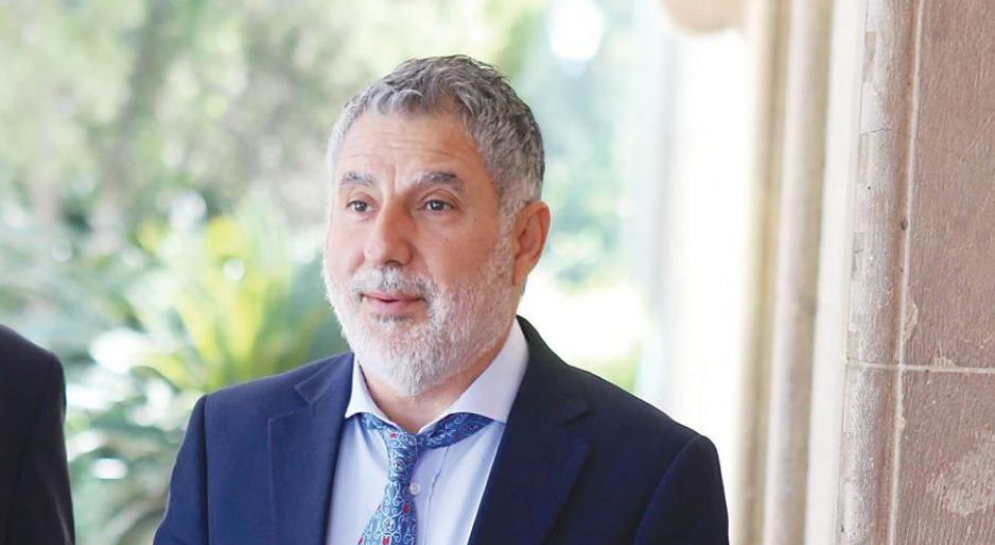
Statements by Andros Kyprianou, General Secretary of the C.C. of AKEL, at a press conference on the situation in the health sector
AKEL C.C. Press Office, 23rd March 2016, Nicosia
 As AKEL, we are concerned and reflecting intensely on the state of our country’s Health sector. Health is underfunded, the public sector is deteriorating and beset by many problems, while the prospect of implementing the National Health System (NHS) seems to be bleak.
As AKEL, we are concerned and reflecting intensely on the state of our country’s Health sector. Health is underfunded, the public sector is deteriorating and beset by many problems, while the prospect of implementing the National Health System (NHS) seems to be bleak.
In seeking to make our contribution, we are submitting this memo with our own positions and proposals. We are ready for further discussion if you think it appropriate.
- AKEL’s core positions on Health
Health is a social commodity. It is a right which any state that respects itself is obliged to provide to its citizens. For a modern state, the way health care is addressed, but also the level of people’s relationship with Health, reflects the level of social justice, but also the culture of a given society. The provision of health care is not a commodity, but a public service that should be provided based on comprehensive social planning. This implies:
- Universal and equal access to health care services
- High quality health care services for all
- Dignified treatment of patients
- Social justice and solidarity in funding
- Support of public hospitals that will constitute the backbone of the NHS
- Independence of the Health Insurance Organisation to ensure good and all-encompassing administration, separation of powers and shielding from petty-political interventions in the management of the fund. Furthermore, protection from the phenomena of non-transparency and corruption.
- Current state of affairs in the health sector – findings
The health sector in Cyprus is unfortunately collapsing and the need for wide-ranging reform in a way that does not convert the right to health care into a privilege is imperative and urgent. What characterizes the health sector in our country today?
- Absence of universal and equal access to quality health services. Cyprus is the only EU member state that does not have a National Health System.
- Health-related expenditure in our country amounts to just 5.5%, compared with 15% across the EU and 14.8% in the Eurozone countries.
- The budgets for health were reduced by more than 185 million Euros in the last three years. Moreover, the revenues from the 1.5% of public employee’s contribution and the 23 million Euros collected from the hospital charges annually were not used for health care.
- Excessive workload, low morale, lower incomes and frustration are forcing doctors and nurses to leave public hospitals. The creation of waiting lists, queues, the lack of medicines and consumables and other severe day-to-day operational problems are now commonplace.
- There is no coordination between the public and private sectors, resulting in the existence of double infrastructures and a waste of resources, while a large part of the private sector due to the economic crisis, the cost of health care and the further turn of citizens to public hospitals remains unused and is being driven to collapse.
- The government’s policy
The government has followed in recent years a neglectful policy with regards the implementation of the National Health System as it had initially been planned, despite the fact that: a) The NHS has been discussed and agreed by all the political parties and social forces since 2012, b) it has been studied by prominent specialized foreign agencies, c) the costing and assessing of its sustainability has just recently been made based on the economic assumptions that were agreed by the government with the Troika, and d) the Troika has accepted it as viable and necessary .
- H only negotiation that appears to have been done over the Memorandum was to suspend the implementation and/or amend the provisions/content of the NHS in the direction of promoting a multi-insurance National Health System. This would increase the cost of its implementation by about 30%, or 300 million Euros, while simultaneously creating different levels of patients, depending on their financial capacity. The government inherited a comprehensive plan for the implementation of the NHS (that had been elaborated by the Christofias government) at a cost acceptable to all social forces with a specific timetable for its implementation by the end of 2015. Instead, over the last three years, the Anastasiades government has submitted a new proposal every year. It is obvious that the government has no real plan, but is improvising on the issue of NHS.
- The government’s tactics has caused job insecurity, led to wage cuts, attacks on public servants including doctors, uncertainty about the future, excessive workload, disorganization and chaos which is forcing many doctors to abandon the public sector and resort to the private sector
- At the same time the freezing of job posts due for promotion has dissolved the hierarchy in many departments, thus resulting in administrative chaos in these departments.
- The government’s actions are leading to the undermining of the public health sector as a result of which the sector cannot play the role it should in NHS conditions. Indirectly, but evidently, patients will be pushed and directed towards private hospitals and insurance. The public hospitals will remain to serve the poor, the unemployed and foreign nationals. In addition, the Government insists that the full autonomy of public hospitals is a prerequisite for the implementation of the NHS.
AKEL supports the autonomy or reorganization of public hospitals, but the manner in which this will be achieved is important. We insist that their public character must be preserved.
All the talk about full autonomy of hospitals is a recipe for disaster. The Thatcherite axe in the British National Health Service began precisely with the slogan of “autonomy” and “competition” as part of a “healthy market”[1]. However, in this sense “autonomy” refers to the management of the austerity where everything that isn’t “financially sustainable” is discarded or assigned to private interests (outsourcing). Consequently, the logic of “competition” is introduced in a sector in which cooperation and coordination are preconditions.
In terms of the provision of the universal right of patients to health care this is devastating: By doing so each infirmary separately is forced to make management of resources regardless of the different needs. If the budget is “exceeded” cuts to essential services are subsequently imposed. Directors are recruited who have nothing whatsoever to do with health, or doctors are forced to turn into “managers”. Under this regime, finances matter more than patient’s universal right to healthcare.
Even from a narrow-minded economistic point of view, this is totally problematic, because it undermines the “economies of scale”, the advantages of the massive single “market” in a health system that requires massive and continuous investment, synergies and the avoidance of wasteful duplication of resources. That is to say, it represents a dogma that serves however an ideology and economic interests that seek to privatize health care.
The NHS can be introduced without full autonomy of public hospitals as well. In most countries where health systems are operating public/state hospitals also operate. What is really required is the reorganization of public hospitals (administrative, financial and scientific) so that they become more efficient and competitive.
This administrative reorganization can also give relative or enhanced autonomy, which would allow the exploitation of synergies, economies of scale, overlapping, complementarity etc.
- AKEL’s positions on autonomy and the reorganization of public hospitals and public health
Basic Principles that must govern the state hospitals after the autonomy or restructuring:
- The state must be the owner.
Hospitals should be non-profit, socially beneficial, and economically self-dependent and self-sustaining. Any eventual profits must be invested back into health care.
Autonomy – reorganization of hospitals can be done with administrative and financial autonomy by creating a strong and independent department at the Ministry of Health, under which all the public hospitals will be integrated into. Each one of them must have full economic self-management, that is to say, their own budget and management.
Characteristics of autonomy:
- Each hospital would be able to cost all their services and establish a wide-ranging comprehensive budget.
- Each hospital should be given the possibility to upgrade its services through a flexible system of recruitment with appropriate salaries, very clear, dignified and homogeneous terms and conditions of employment.
- Public hospitals should remain within the state apparatus but gain economic self-government as all the departments of government.
- A clear structure to be staffed with the required number of doctors and paramedical staff should be decided.
- The amalgamation decided in 2012 addresses the fragmentation of services and creates a single infrastructure that is complementary.
- Labour relations and gains must be safeguarded. This is considered as representing the most difficult issue in terms of autonomy. Recruitment/hiring can be made with specific contracts, but with very clear terms and conditions of employment.
- The existing doctors will continue to work under the current system, but the promotion of the doctors whether they are called public servants (existing) or contract (contracts) will be done with the same procedures and they will have the same duties and responsibilities.
- The status, but also the way newly incoming nurses are promoted, as well as the procedure of their professional progression, must be discussed. The existing process for recruiting temporary nurses must be revised because it undoubtedly is not the most meritocratic.
- Autonomy in decision making must be given.
- Scientific councils and advisory committees must be set up, with immediate decisions in hospitals.
- The management team of the hospital needs to be strengthened. Its Director must be the legal responsible person for the entire operation of the hospital.
- Each clinic has its own internal budget to be monitored by each director of the clinic. He/she will approve all the internal supplies charges from the central stock store.
- A modern management structure should be implemented that will provide flexibility in decision making and adaptability to the constant changes in society and medical matters (Recruitment, provision of incentives, setting goals for productivity increase, purchase of technology, internal audit, utilisation of budgets whenever and wherever necessary, computerization, security and insurance of staff, releases of staff, research).
- Internal and external control mechanisms should be established. There must be control mechanisms for sound governance and the prevention of irregularities.
- There should a provision for a special budget for on-going training – education for all staff without exception.
- There should be an annual budget and a 5-year planning scheme. The submission of the budget should be made by the hospital.
- An annual financial audit should be conducted by an independent state agency.
- Minimum acceptable levels of health provision should be set up and the systematic quality control of the implementation of these levels should be regular.
- The introduction of the custom of research should be introduced in hospitals.
- Cooperation/partnership between hospitals should be promoted (purchase of medicines, tools, supplies, technology, exchange of scientific knowledge/recommendations, hospitals should be covered with all the expertise).
- Salary readjustments and granting of incentives must exist.
- Donations can be utilised, but always under strict control.
- AKEL’s positions regarding cancer
- Implementation of the National Strategy Plan on cancer that was elaborated and prepared by the Christofias administration and subsequently approved by the House of Representatives.
- Decision making and planning for the function for radiotherapy centres in the General Hospital of Nicosia and Limassol. (This policy goal was fulfilled during the Christofias government)
- The cancellation of the creation of radiotherapy centres is leading to a monopoly in cancer treatment services, which is dangerous within the framework of the implementation of a NHS. There is a danger that not all patients will be covered. This decision taken by the Anastasiades Government has annulled the plans made over years and is contrary to the guidelines of the National Committee for the fight against cancer and contrary to the European directives on radio therapy.
- Medical Faculty
Real support and the creation of all of the necessary Medical School infrastructures are demanded. An agreement on the creation of university clinics should be promoted.
In an effort to contribute in a concrete way, AKEL submits the following proposals:
- AKEL’s concrete proposals on health
- The government should immediately proceed to table and approve the legislative framework for the implementation of the NHS as it had been planned and unanimously voted and agreed upon by broad social consensus.
- Expenditure related to health must be restored to 2011 levels except the fund regarding the sending of patients abroad. The amounts collected from the charges imposed in public hospitals and the contributions of civil servants should be re-invested back into public health care. A real increase in the budget on health is required, so that we finally begin a reform based on people’s needs and interests and not on the profit motive.
- An honest dialogue with the opposition and healthcare agencies must be initiated. This dialogue must serve public interest and equal quality health care for all citizens.
- The independence, but also the control of the Health Insurance Organisation (HIO) must be enhanced so as to ensure good administration, the separation of powers, and its protection from phenomena of non-transparency and corruption, as well as from political interferences in the management of the fund.
- Public hospitals should be strengthened to form the backbone of the NHS. Undoubtedly state hospitals need reorganization in their operation (administrative, financial and scientific), modernization and greater transparency in their procedures so as to provide flexibility in taking and implementing decisions through a system that ensures the provision of quality health care.
- A structure in public hospitals should be decided and set out. Posts/positions should be de-frozen and covered; temporary staff should be made permanent. The posts of Directors and Assistant Directors should be filled for the better functioning of the departments. All the vacant posts should be de-frozen and filled.
- The nation-wide waiting lists for each category of illnesses, but also at each hospital separately, must be tackled. The seriousness of the various occurrences should be registered so that they are classified according to their degree of priority.
Poor management, lack of timely updating and the non-existence of a single computerized registering system renders waiting lists flawed. It is imperative that immediate measures are taken in order to reduce waiting list, such as:
Creation of a central electronic waiting list system
Regular re-examination of patients by their doctors
Regular updating of waiting lists and their continuous monitoring
Waiting lists made public with respect to personal data so that there is transparency
Implementation of clinical protocols aiming to avoid unnecessary referrals for diagnostic tests
- The establishment of a radiotherapy centre at the General Hospital of Nicosia and Limassol should be promoted.
- The overtime program to reduce waiting lists should be expanded.
- There should be ongoing funding of patients with neurological diseases (e.g. multiple sclerosis) for an MRI examination (by way of the “running contract” method with private centres).
- New approved, specialized pharmaceutical products (especially for patients with neurological diseases, hepatitis C, thalassemia and cancer) should be granted, according to modern scientific protocols.
- Pay scales of health professional workers should be upgraded to 2011 levels. Incentives should be provided for overtime employment.
- Reference centres should be set up and a national strategy for each patient group should be elaborated.
- New clinics should be developed and constructed – neurology, rheumatology, infectious, radiation therapy, ICU in all hospitals, trauma, Neuroradiology, interventional radiology.
- Clinical pharmacists should be appointed in hospitals. There should be at least one present in each hospital.
- A comprehensive education policy for health professionals based on the program for the constant education of health professionals (conferences, small and long-term scholarships).
AKEL on the issue of health, as with the Cyprus problem and in all matters affecting people’s day-to-day issues, has reiterated many times and demonstrated that it will support those Government efforts that move within a correct framework, namely equal access and high level of health care services for all citizens.
AKEL will creatively, but also militantly assert what is a right: for what is right: equal quality health care for all citizens.
[1] Jacky Davis and Raymond Tallis, “NHS SOS: How the NHS was betrayed and how we can save it”, Oneworld, London




